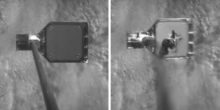NASA announced this Thursday that it will be working with nine companies to send scientific material into outer space. NASA did not outright demand money in exchange for its services. But the bidding process to send scientific material to the Moon has kicked off.
The event was quite theatrical and fun. NASA was taking questions from everyone including kids, and there was an astronaut jumping on a wire. This was done to resemble the Moon’s low gravity atmosphere.
This announcement showed that the Science Mission Directorate at NASA is getting more vested into the mission. Thomas Zurbuchen, who oversees scientific activities for NASA, said this Thursday,
“The Moon is full of secrets that we don’t know yet.”
The US government is also greatly linked to the space mission. Commercial Lunar Payload Services is the term given to the contracts and nine countries have signed the deal so far.
The companies that cut a deal with NASA are:
- Deep Space Systems: Littleton, Colorado
- Lockheed Martin Space: Littleton, Colorado
- Masten Space Systems Inc.: Mojave, California
- Draper: Cambridge, Massachusetts
- Astrobotic Technology Inc.: Pittsburgh
- Orbit Beyond: Edison, New Jersey
- Moon Express: Cape Canaveral, Florida
- Intuitive Machines LLC: Houston
- Firefly Aerospace Inc.: Cedar Park, Texas
NASA believes the payload delivery process could begin as early as from 2019. The combined maximum monetary value of these contracts equals $2.6 billion. NASA doesn’t seem to have added any stipulations regarding quantity limit or time limit.
The space agency does, however, weigh in factors such as “technical feasibility, price, and schedule,” when comparing bids. NASA is looking to focus its efforts on space exploration and making traveling to the Moon as easy as it can be.
Once this is accomplished, NASA will focus on testing technology on the Moon for possible human-aided missions to Mars. NASA also wants to figure out possible resources that could aid in improving living conditions on the moon.
The space agency also wants to explore rare materials that are short on our planet, and even provide rocket fuel for any mission within our Solar System.
NASA wants to determine the importance of such materials, specifically water. NASA did cancel a vital mission that would have helped in determining water ice in the permanently shadowed craters near the lunar poles.
Bob Richards, the founder of Moon Express, told Ars Technica,
“This is on the critical path for any commercial company wanting to provide commercial lunar services. The threshold of capitalization needed and the nascent market of commercial lunar customers is otherwise out of reach of most companies, certainly most startups. So NASA is providing a critical priming of the pump to get things going.”
The businesses were looking forward to NASA’s plans for the progress of mankind and expanding profits at the same time as well. Just the guarantee of having major financial banking for each mission will be enough motivation for NASA to make deep space exploration a reality.




Share Your Thoughts